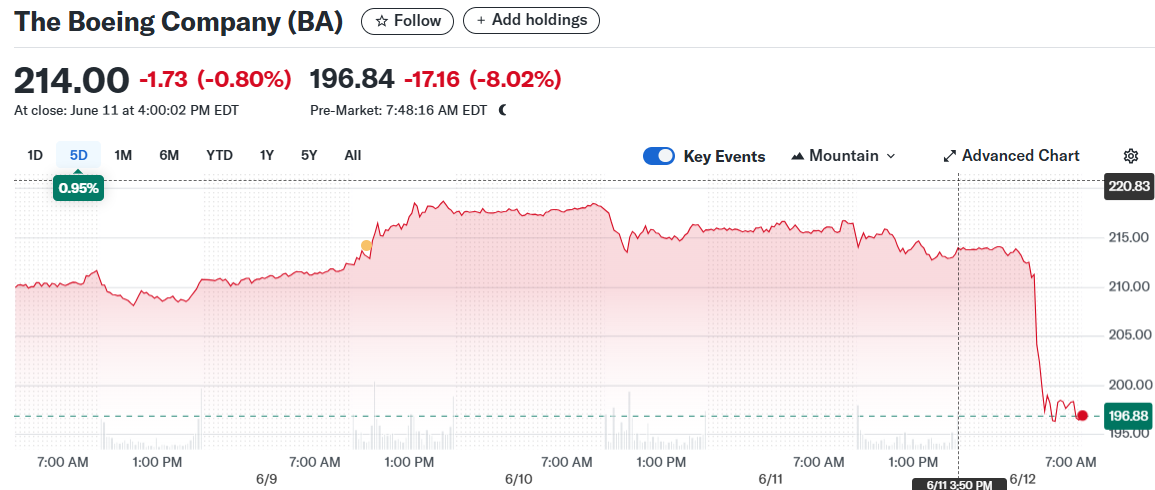TLDR
- Boeing stock fell nearly 8% in premarket trading after Air India Flight AI171 crashed near Ahmedabad, India with 242 people on board
- The aircraft was an 11-year-old Boeing 787-8 Dreamliner headed to UK’s Gatwick Airport that crashed shortly after takeoff
- India’s health minister confirmed “many people” were killed in the crash, though exact casualty numbers remain unclear
- Boeing stated it was aware of reports and working to gather more information about the incident
- GE Aerospace shares also dropped 4.7% as their GEnx engines powered the crashed 787
Boeing shares took a nosedive Thursday morning, falling nearly 8% in premarket trading after an Air India aircraft carrying 242 passengers and crew crashed near Ahmedabad, India.

Flight AI171 was bound for Gatwick Airport in the UK when it went down shortly after takeoff. The aircraft crashed in a civilian area near Ahmedabad airport, according to local police officers who responded to the scene.
India’s federal health minister confirmed that “many people” were killed in the crash. However, authorities have not released specific casualty figures as rescue operations continue.
#BREAKING: AIR INDIA FLIGHT #AI171 CRASHES IN AHMEDABAD SHORTLY AFTER TAKEOFF
Following reports of a crash involving Air India flight #AI171 from Ahmedabad to London Gatwick. The Boeing 787-8 Dreamliner (reg: VT-ANB) lost signal at 08:08:51 UTC, just seconds after takeoff.… pic.twitter.com/RKFhipU1ll— Turbine Traveller (@Turbinetraveler) June 12, 2025
The aircraft involved was an 11-year-old Boeing 787-8 Dreamliner, according to aviation tracking service Flightradar24. This particular model represents one of Boeing’s most modern passenger aircraft currently in service.
Boeing responded to the incident with a brief statement. “We are aware of initial reports and are working to gather more information,” the company said in an emailed response to media inquiries.
Air India also issued a statement on social media platform X. “The injured are being taken to the nearest hospitals,” the airline said, adding that they were providing full cooperation to investigating authorities.
Market Reaction Reflects Investor Sensitivity
Boeing stock dropped to $198.45 in early trading, representing a 7.3% decline from the previous close. The broader market also felt the impact, with S&P 500 and Dow Jones Industrial Average futures falling 0.5% and 0.7% respectively.
Investors remain particularly sensitive to aircraft incidents following Boeing’s troubles with the 737 MAX. That aircraft was grounded worldwide from March 2019 to November 2020 after two deadly crashes linked to faulty flight control software.
The 787 Dreamliner has maintained an excellent safety record since entering service in 2011. Prior to Thursday’s Air India incident, the twin-aisle commercial airliner had never experienced a hull loss – an accident resulting in the complete loss of an aircraft.
Chris Beauchamp, an analyst at IG Group, characterized the stock decline as a knee-jerk reaction. “There’s revised fears of the problems that plagued Boeing aircraft and Boeing itself in recent years,” he explained.
Manufacturing Quality Concerns Persist
Boeing has faced manufacturing quality issues dating back to 2020. The company recently completed a review with the Federal Aviation Administration, which allowed Boeing to increase 787 production from five to seven jets per month.
This production ramp-up was seen as a positive sign that quality controls had improved. The timing of Thursday’s crash comes as new CEO Kelly Ortberg works to rebuild trust in Boeing’s safety practices.
GE Aerospace also felt the market impact, with shares falling 4.7% in premarket trading. The company’s GEnx engines powered the crashed Air India 787.
“We are deeply saddened by the loss of Air India Flight AI-171,” GE Aerospace said in a statement. “We extend our heartfelt sympathies to the families and loved ones of those impacted.”
The engine manufacturer added that it had activated its emergency response team and stood ready to support both the customer and ongoing investigation efforts.
Given the aircraft’s age and the 787’s safety history, aviation experts suggest a manufacturing defect is unlikely to be the root cause of the accident. The investigation will determine the exact circumstances that led to the crash.






